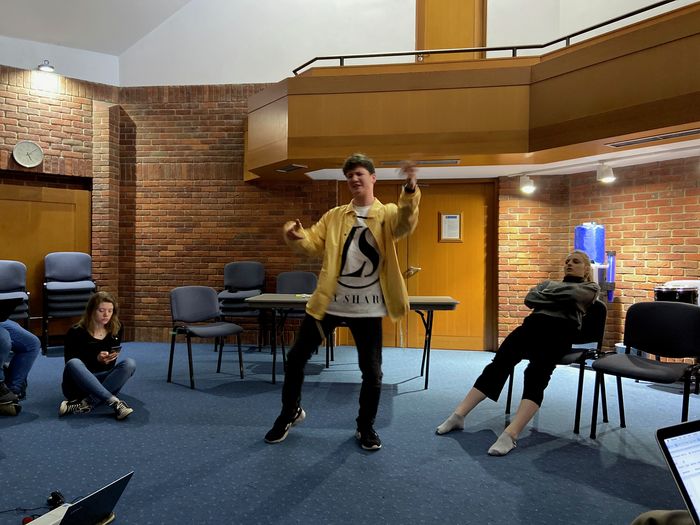The Footlights Spring Revue is slick and stylish but underwhelming
Frances Arnold has a good time reviewing the Revue but yearns for more exciting comedy from Cambridge’s premier sketch troupe

Oooh, The Footlights. The Footlights? No, but like The Actual Cambridge Footlights? David Mitchell was in that, wasn’t he? And - and Stephen Fry, too? Wow, that’s some big shoes to fill. They must be really good..ahh...crsk...wait, sorry, the signal’s really bad here...csrkk...zzzh….
Sorry about that, I simply don’t know what happened. Anyway. The Footlights. That famous breeding ground for gangly future Mock the Week stars and Edinburgh Comedy Award-winning sketch duos that are just ok. Their annual Spring Revue, Crossed Wires, sees the graduating stars of the Cambridge comedy scene collaborate in an evening of sketches vaguely based around phones and connections, which range considerably in length, content and, unfortunately, quality.
The show as a whole, though, is energetic and well-crafted, bouncing rapidly from sketch to sketch like a cold caller ringing number after number to ask if they’ve been mis-sold PPI, never lingering too long on one idea or allowing a sketch to grow stale. The set is visually exciting, the lighting creatively used and the sound design witty and slick. What stands out most is the brilliant physicality of the Footlights themselves; the absolute mastery of their own movements and facial expressions heighten the comedy in every sketch. Indeed, among the performers, there are no weak links; although there are altogether too many superfluous and basically uninteresting white men, I suppose this can be seen as a depressingly accurate summary of the Cambridge student population as a whole. Angela Chanell is one of the stand-out performers, serving impressive facial contortions, while the comedic versatility and excellence of Mariam Abdel-Razek and Jamie Bispring also shines. Meanwhile Harry Balden’s droll, Tim Keyish presence is inherently funny no matter how lazily written the sketch; he is clearly destined for big things (also shout-out to his fantastic trainers).
This show was not designed to change the face of the British comedy scene, but rather, to emulate it.

Turning to the writing itself, the extended sketches tend to work better than the snappy jokes and one-liners, allowing the ensemble work and comic abilities of the various performers to shine through. There is inevitably some gross-out humour, including a reference to Rapunzel’s pubic hair and a surprising amount of bestiality jokes. The obligatory references to current events are thankfully few, the comedians avoiding scoring cheap laughs with easy targets; there is (almost) nothing about Brexit, and, crucially, no Trump jokes (although the unexpected appearance of Prince Andrew almost made me spit out my drink).
For me, the highlights of the night are the weirder sketches; the two estate agents reenacting Les Mis are absurd and surreal and sweet and brilliant, while during the horoscope-obsessed newborn sketch I wrote in my notes “literally what is going on - but like - in a good way?” (key lines including "for the last time, will you please put me back into the womb!"). While other sketches veer on the ridiculous, they were never taken as far as I wanted them to go, the group largely opting for easy jokes and safer punchlines over more experimental and interesting material.
I was glad that they touched on the often problematic history of the Footlights in the closing of the first half, although the mocking of its past overwhelming whiteness and maleness feels awkward when the vast majority of the performers remain middle-class white men - for me the reference felt winkingly self-referential rather than self-aware.

Many sketches, although performed brilliantly, are let down by the quality of the writing; similarly, lots of the sketches have promising set-ups and deliveries but are ruined by their punchlines, which often feel unnecessary and obvious. Not every sketch needs a clever twist, and the Footlights are at their best when they're just existing, but funnily (an example being the shoe shop sketch, where the charm of Bisping's character comedy was let down by the weakness of the ending reveal). The second half felt somewhat padded with unfinished or underdeveloped shorter and weaker sketches; perhaps the performers let the quality drop assuming that the audience would return from the interval slightly tipsier and more forgiving (to be fair, the show cocktail, The Spring Revue-Woo, was one of the highlights of the night). The sketches riffing on Pride and Prejudice and the Memoirs of a Goldfish, among others, were unexciting, although there were unexpected high points, such as the lovesong of Denise and Gleve (Romeo and Juliet who?) and Bryan and his loyal news team.
I am not a comedian; I’m not even that funny (the readers of this review immediately protest, and loudly too!). I was taking notes throughout in the dark of the audience, and at one point simply scrawled the word “comedy” in response to a sketch. So I really know what I’m talking about. The show is, unsurprisingly, very sold out, so the pretty mediocrely written words of this quite tired reviewer don’t ultimately mean anything; don’t feel too bad if you’re unable to find a ticket, but equally, hold onto your ticket if you’ve managed to snap one up.
Was it subversive, or challenging, or innovative? No, not really. This show was not designed to change the face of the British comedy scene, but rather, to emulate it. It’s sharp and funny and tight and stylish and that’s pretty much it. So, then, what does the future of comedy look like? Sort of the same, really.










